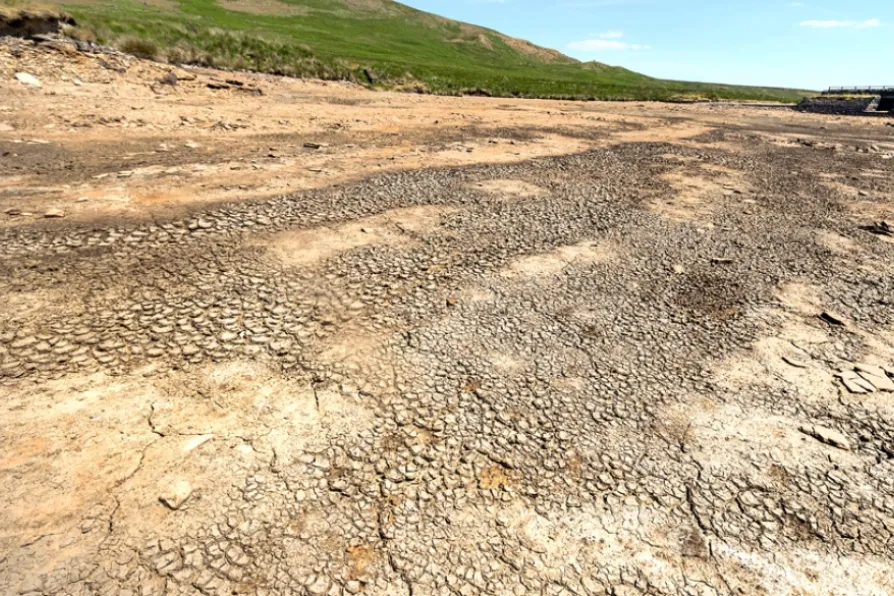Durham Miners’ Association general secretary ALAN MARDGHUM speaks to Ben Chacko ahead of Gala Day 2025

 The dry banks of March Haigh reservoir near Kirklees in West Yorkshire last week
The dry banks of March Haigh reservoir near Kirklees in West Yorkshire last week
When I used to write about something called global warming, many folk would only half-jokingly comment that they wouldn’t mind Britain having a bit of a warmer climate.
As we realised that it wasn’t that simple, we used the more accurate description “climate change,” but the last few weeks of tropical heatwave here in Britain and in many other places around the globe suggest global warming wasn’t so far off the mark.
Today Britain is roasting in yet another week of heat, with parts of the country reaching temperatures of 36°C (95°F). After weeks without rain, as you read this in today’s Morning Star I hope you and I are enjoying torrential downpours with as much as 30mm (in) of rain expected to fall in an hour.
That, at least, is what the Meteorological Office was predicting for today.
Over the last week or two, temperatures over 33°C were recorded in Suffolk and last Monday was the hottest day of the year so far. The hottest July temperature on record is 36.7°C — back in July 1 2015 at Heathrow.
Sadly, but perhaps not surprisingly there are no legal restrictions for when a workplace becomes too hot. The TUC has long been campaigning for a change in the law to introduce a new maximum indoor temperature of 30°C, or 27°C for those doing more physically strenuous jobs.
TUC general secretary Frances O’Grady told the Morning Star that employers should allow staff to work flexible hours to avoid travelling at peak times and also let workers wear lightweight clothing.
An Amber Heat Health Watch warning was issued this week for parts of England, advising people to stay out of the sun for the remainder of the working week.
This warning is issued when temperatures are predicted to hit 30°C during the day and 15°C at night for at least two consecutive days.
Much of Britain has now had 54 consecutive dry days, meaning less than 1mm of rain has fallen. Parts of Bury St Edmunds in drought-hit Suffolk have had no rain at all for 48 days.
Lakes and reservoirs all over the country are drying out, with cracked bottom mud replacing the water. Hose pipe bans are threatened by privatised water companies that still do little about their own disastrous leakage record.
Forest and grassland fires are another disastrous consequence of the heat and lack of rain, but far too many of these appear to be set alight deliberately.
In Athens death tolls are growing in every newscast as arson among tinder-dry resinous pines and dune grass, added to a fire-fighting service depleted by enforced EU austerity cuts, proved the perfect scenario for a major, and still growing, disaster.
Japan too reports large death tolls from day and night temperatures over 40°C. California reports its own heatwave, mitigated only by mass use of air conditioning inside buildings.
Sweden, Tbilisi in Georgia, Eastern Canada and many other places registered record temperatures.
Against this world-wide trend it is probably not really worth asking if our heatwave is just a quirk of Britain’s always unpredictable weather. Or is it really down to climate change?
In fact there is no doubt that our present soaring temperatures are linked to global warming, scientists say.
“There’s no question, human influence on climate is playing a huge role in this heatwave,” Professor Myles Allen, a climate scientist at the University of Oxford, told the press.
Professor Peter Stott, a science fellow at the Met Office, said global warming of 1°C since the industrial revolution was clearly making extreme heat more likely.
“It is increasing quite significantly the risk of such a heatwave. The temperatures of 30°C and above this week have gone from being a very rare occurrence to not a frequent occurrence but much more likely,” he said.
However, global warming, climate change or whatever you want to call it won’t stop Donald Trump and his band of climate change deniers on both sides of the Atlantic telling us we have nothing to worry about.
Still the most strident British denier is Lord Nigel Lawson, former chancellor of the exchequer under Margaret Thatcher. Lawson is the grandfather of British neoliberal economics and has been a high-profile opponent of climate change mitigation action, labelling the Kyoto Protocol wrongheaded.
James Delingpole is a Telegraph and Spectator journalist increasingly well-known as a climate change denier. His articles often amount to nothing more than unscientific poking fun at what he describes as liberals and lefties.
Bjorn Lomborg is a Danish author best known for his controversial book The Skeptical Environmentalist and while he does not deny that climate change is happening, he seeks to minimise its importance.
Australian geologist Professor Ian Plimer is the director of three Australian mining companies and a prominent climate-change denier. With these lucrative mining interests, it is unsurprising that his book Heaven and Earth has been labelled the “denier’s bible.”
Dr Benny Peiser, who is director of the Global Warming Policy Foundation set up by Nigel Lawson, has been extensively quoted in British media as an expert on global warming, attacking renewables and promoting shale gas fracking despite his lack of academic qualifications in either climate science or energy.
In fact, his previous role was as a part-time senior lecturer in sports science at Liverpool John Moores University.
Another denier is Tory hereditary peer Viscount Ridley who is adviser to something called The Global Warming Policy Foundation. He advocates expanded gas fracking and criticises renewable energy.
Finally, former Ukiper Viscount Monckton of Brenchely claims that “global warming will not affect us for the next 2,000 years and, if it does, it won’t have been caused by us.”
These then are some who will tell you climate change is nothing to worry about. Meanwhile, we all sweat and it really seems to me we do have something to sweat about.
Frosty’s Ramblings appears every Friday in the Morning Star.



















